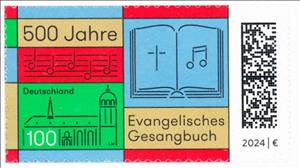Stamp: Evangelical Church Songbook, 500 Years (Germany, Federal Republic 2024)
Evangelical Church Songbook, 500 Years (Germany, Federal Republic 2024)
04 January (Germany, Federal Republic ) within release Evangelical Church Songbook, 500 Years goes into circulation Stamp Evangelical Church Songbook, 500 Years face value 100 Euro cent
| Stamp Evangelical Church Songbook, 500 Years in catalogues | |
|---|---|
| Colnect codes: | Col: DE 2024.01.04-05 |
Stamp is horizontal format.
Also in the issue Evangelical Church Songbook, 500 Years:
- Full Pane - Evangelical Church Songbook, 500 Years face value 10*100;
- Stamp - Evangelical Church Songbook, 500 Years face value 100;
- Stamp - Evangelical Church Songbook, 500 Years face value 100;
- Mini Sheet - Evangelical Church Songbook, 500 Years face value 10*100;
Stamp Evangelical Church Songbook, 500 Years it reflects the thematic directions:
A book is a medium for recording information in the form of writing or images. Books are typically composed of many pages, bound together and protected by a cover. Modern bound books were preceded by many other written mediums, such as the codex and the scroll. The book publishing process is the series of steps involved in their creation and dissemination.
A Christian is a person who follows or adheres to Christianity, a monotheistic Abrahamic religion based on the life and teachings of Jesus Christ. Christians form the largest religious community in the world. The words Christ and Christian derive from the Koine Greek title Christós (Χριστός), a translation of the Biblical Hebrew term mashiach (מָשִׁיחַ) (usually rendered as messiah in English). While there are diverse interpretations of Christianity which sometimes conflict, they are united in believing that Jesus has a unique significance. The term Christian used as an adjective is descriptive of anything associated with Christianity or Christian churches, or in a proverbial sense "all that is noble, and good, and Christ-like." It does not have a meaning of 'of Christ' or 'related or pertaining to Christ'.
Music is an art form and cultural activity whose medium is sound organized in time. The common elements of music are pitch (which governs melody and harmony), rhythm (and its associated concepts tempo, meter, and articulation), dynamics (loudness and softness), and the sonic qualities of timbre and texture (which are sometimes termed the "color" of a musical sound). Different styles or types of music may emphasize, de-emphasize or omit some of these elements. Music is performed with a vast range of instruments and vocal techniques ranging from singing to rapping; there are solely instrumental pieces, solely vocal pieces (such as songs without instrumental accompaniment) and pieces that combine singing and instruments. The word derives from Greek μουσική (mousike; "art of the Muses"). In its most general form, the activities describing music as an art form or cultural activity include the creation of works of music (songs, tunes, symphonies, and so on), the criticism of music, the study of the history of music, and the aesthetic examination of music. Ancient Greek and Indian philosophers defined music as tones ordered horizontally as melodies and vertically as harmonies. Common sayings such as "the harmony of the spheres" and "it is music to my ears" point to the notion that music is often ordered and pleasant to listen to.



